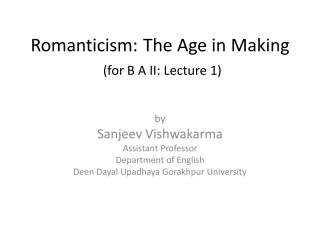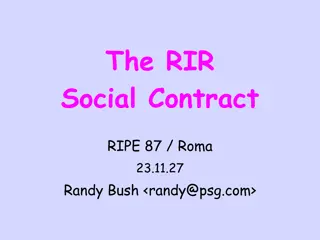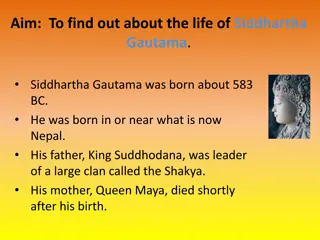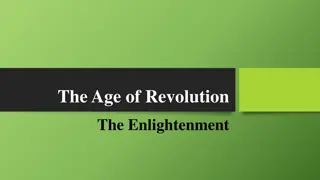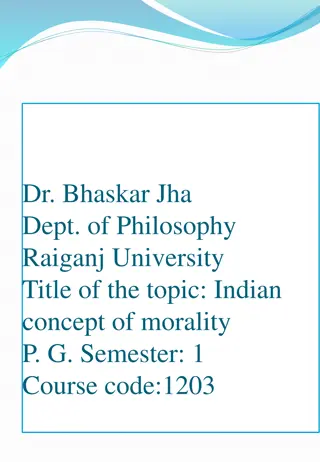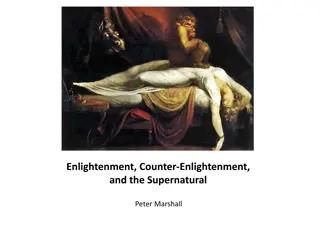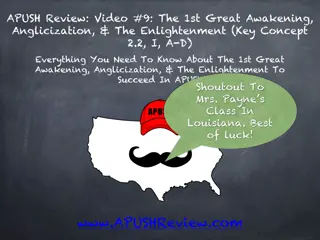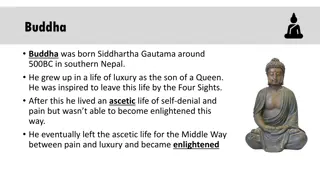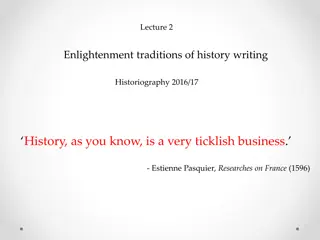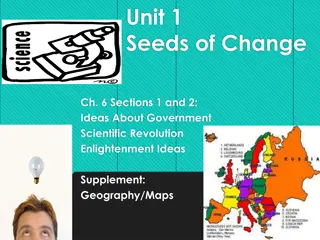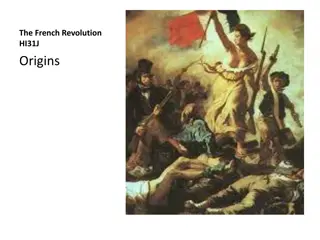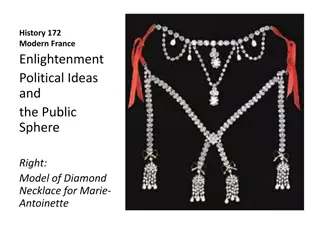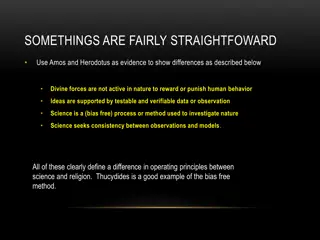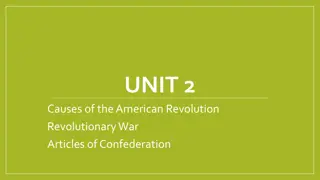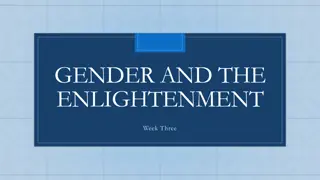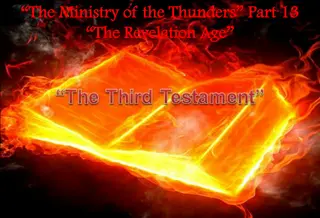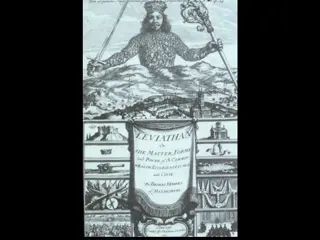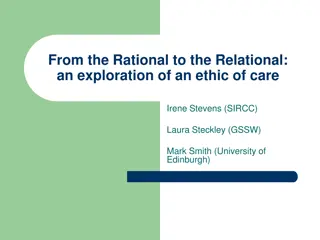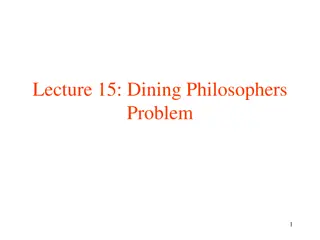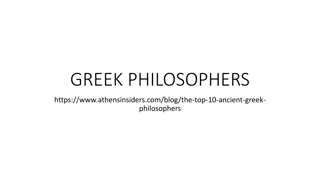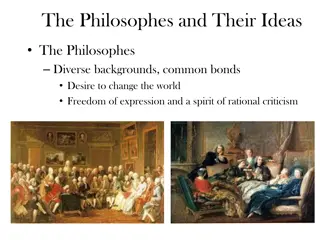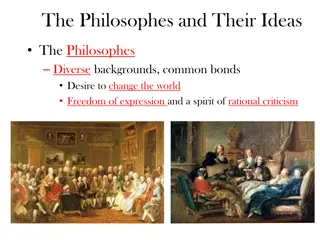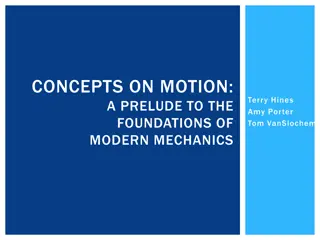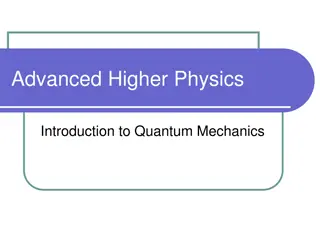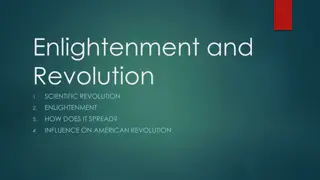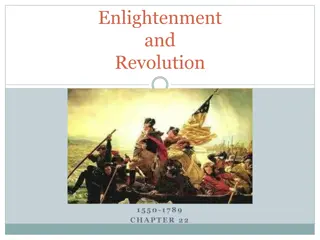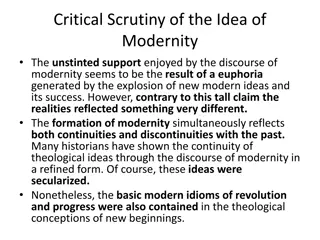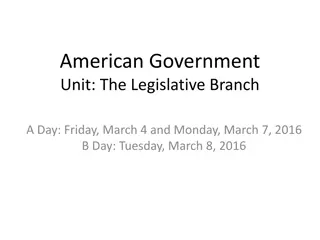Romanticism: The Age in Making
Explore the origins and characteristics of Romanticism in this informative lecture, covering the Enlightenment, American Independence, and the shift away from Enlightenment Neo-classicism.
19 views • 20 slides
Liberty & The Age of Enlightenment The American Battlefield Trust
The Age of Enlightenment, with its emphasis on natural law, liberty, progress, and constitutional government, greatly influenced American thinking and the Revolutionary War. Key figures like John Locke and Sir William Blackstone contributed ideas of social contract and law that shaped American gover
2 views • 15 slides
Understanding RIPE and the Social Contract in the Age of Enlightenment
The RIPE Social Contract delves into the theory of social contracts originating from the Age of Enlightenment. It explores the legitimacy of the state's authority over individuals and discusses the expectations and roles of RIPE, NCC, and RIRs within the internet ecosystem. RIPE's objective is to co
0 views • 33 slides
The Life of Siddhartha Gautama: A Journey to Enlightenment
Siddhartha Gautama, born around 583 BC in Nepal, was destined for greatness. Despite being shielded from the harsh realities of life, he was deeply moved by the suffering he witnessed and left his luxurious life at the palace in search of enlightenment. Renouncing his princely status, Siddhartha bec
0 views • 7 slides
Enlightenment Thinkers and Their Ideals
The Age of Revolution was marked by influential Enlightenment thinkers such as Thomas Hobbes, John Locke, Montesquieu, and Jean-Jacques Rousseau. These philosophers explored human nature, government, and society, shaping modern political thought. Hobbes emphasized a pessimistic view, advocating for
2 views • 9 slides
Evolution of Anthropology: From Herodotus to Modern Times
Anthropology has evolved over centuries, with roots tracing back to ancient Greeks like Herodotus. The discipline developed into a scientific field during the European Enlightenment and has since progressed to study the science of humanity and cultural differences. Philosophers like Plato and Aristo
1 views • 40 slides
Insights into Buddhism: History, Philosophy, and Schools
Buddhism, a spiritual tradition focused on personal development and attaining deep insight into life, boasts 376 million followers globally. Rooted in the teachings of the Buddha, it emphasizes reaching nirvana through morality, meditation, and wisdom. The history of Buddhism traces back to Siddhart
0 views • 33 slides
Exploring the Indian Concept of Morality in Philosophy
Delve into the intricate discussions surrounding morality in Indian philosophy, exploring the distinctions made between what is and what ought to be. Compare Western and Indian perspectives on morality and examine key criteria proposed by philosophers like Kurt Baier and Frankena. Discover how India
4 views • 20 slides
Enlightenment, Counter-Enlightenment, and the Supernatural
The relationship between religion and the Enlightenment was characterized by a shift towards viewing them as non-antagonistic entities, despite some lingering conflicts. While the Enlightenment aimed to combat religious bigotry and superstition, it did not eradicate supernatural beliefs entirely, le
0 views • 8 slides
The 1st Great Awakening, Anglicization, & The Enlightenment in APUSH
This content covers key concepts in APUSH related to the 1st Great Awakening, Anglicization, and the Enlightenment. It discusses the religious revival, emergence of new sects, Enlightenment ideas, Anglicization of the colonies, and Britain's mercantilism and imperial aims. The impacts on colonial so
0 views • 10 slides
Influential Philosophers Through Time
Influential philosophers from different periods in history, such as Confucius from ancient China, Socrates and Plato from ancient Greece, Aristotle, Paul of Tarsus, René Descartes, and John Locke. These thinkers contributed groundbreaking ideas to philosophy and society, shaping the way we understa
0 views • 10 slides
The Life and Teachings of Buddha
Buddha, born as Siddhartha Gautama around 500BC in Nepal, left a life of luxury to seek enlightenment after encountering the Four Sights. He eventually found enlightenment through the Middle Way, understanding the Four Noble Truths and following the Eightfold Path. His teachings on suffering, imperm
0 views • 9 slides
Renaissance Historiography: Writing Histories in the Enlightenment Era
The Enlightenment period saw a shift in historical writing towards valuing the past for its own sake. Scholars like Francesco Petrarch and Estienne Pasquier explored different approaches to interpreting history, incorporating philology, individual chronicles, and the portrayal of great men and women
0 views • 35 slides
Seeds of Change: Government, Science, and Enlightenment in European History
Explore the evolution of government, scientific revolution, and Enlightenment ideas in Europe through monarchies, the Scientific Revolution's impact on society, and the Age of Reason. Uncover the shift towards questioning authority and the pursuit of logic and reason. Delve into the significance of
0 views • 22 slides
Exploring Anti-Enlightenment Traditions in the EU
This text delves into the concept of the anti-Enlightenment tradition and its influence on cynicism within the European Union. It analyzes the ideological roots, cultural implications, and political manifestations of this tradition, contrasting it with Enlightenment principles such as human rights,
0 views • 9 slides
Enlightenment Philosophers and Their Influence on the French Revolution
The French Revolution was influenced by Enlightenment philosophers like Thomas Hobbes, Rousseau, Voltaire, and Montesquieu. Their ideas on social contracts, collective sovereignty, enlightened absolutism, and the need for checks and balances challenged the traditional Ancien Régime's feudalism, pri
0 views • 26 slides
Enlightenment Political Ideas in Modern France
The Enlightenment era in Modern France brought forth significant political ideas and discussions, including Thomas Hobbes' concept of social contract and Rousseau's emphasis on collective sovereignty. Montesquieu advocated for checks-and-balances in government, while Voltaire promoted enlightened ab
0 views • 21 slides
The 7 Stages of Spiritual Awakening: A Journey to Enlightenment
The path of spiritual awakening is a profound journey that leads to deep inner transformation and enlightenment. visit us :- \/\/mystickentah.com\/
0 views • 13 slides
Contrasting Science and Religion Through Ancient Philosophers
The content explores the differences between science and religion using examples from ancient philosophers like Amos, Herodotus, and Epicurus. It highlights how science relies on testable data and unbiased processes, while religion involves divine forces and unverifiable beliefs. The text emphasizes
0 views • 5 slides
Causes of the American Revolution and Enlightenment Influence
Explore the causes of the American Revolution, from key events and legislation to influential figures like George Washington and Thomas Jefferson. Discover the impact of Enlightenment thinkers like John Locke and Baron de Montesquieu on the revolutionary ideas that shaped American history.
0 views • 33 slides
Gender and the Enlightenment: Understanding Perspectives on Gender Roles
This study delves into the Enlightenment period, exploring the views on gender, female participation, men and feminism. It discusses key figures like Jean-Jacques Rousseau and their beliefs on gender distinctions. The text examines how education was perceived to shape gender roles within society, sh
0 views • 24 slides
The Age of Revelation: A Time of Ultimate Spiritual Enlightenment
We are experiencing a profound era of revelation like never before in the history of Sonship. This period transcends previous ages by presenting a comprehensive and perfect view of the divine plan. Through cognitive revelation, believers are sharpening their spiritual logic and intellect, embodying
0 views • 33 slides
Science-Based Global Enlightenment in the Quantum-Digital Age
Global Enlightenment in the Quantum-Digital Age explores the urgent need for a science-based approach to address climate change and prevent environmental crises that could lead to a dead planet. It emphasizes the shift from a Hyper-Expansionist socio-economic system to a Sane, Humane, Ecological one
0 views • 25 slides
Insights into the Enlightenment Thinkers: Philosophers of Change
The Enlightenment era marked a shift towards reason and enlightenment, with thinkers like Locke, Hobbes, Montesquieu, Rousseau, and Voltaire advocating for progress, natural law, and individual rights. Each philosopher contributed unique ideas to reshape societal structures, challenging traditional
0 views • 18 slides
Exploring Ethical Dimensions in Social Work
Delve into the ethical underpinnings of social work from the Rational to the Relational perspective, tracing the evolution of care ethics through the Scottish Enlightenment philosophers to contemporary discussions on universal ethics and feminist critiques of managerialism in social work practice.
0 views • 27 slides
Evolution of Criminal Law and Thought: From Pre-Classical Era to Enlightenment
Explore the progression of criminal law and thought from the Pre-Classical School of Thought to the Enlightenment era. Delve into concepts like folkways, mores, and the origins of criminal law, including examples such as societal norms, dress codes, and supernatural explanations for behaviors during
0 views • 23 slides
Dining Philosophers Problem and Mutual Exclusion Solutions Review
This lecture discusses the Dining Philosophers Problem, a classic synchronization issue in computer science. It covers various solutions for achieving mutual exclusion, including software-based solutions like Peterson's algorithm and hardware-based solutions like Test-and-Set (TSL/XCHG). Additionall
0 views • 17 slides
Ancient Greek Philosophers and Their Revolutionary Ideas
Explore the influential ancient Greek philosophers like Anaxagoras and Pythagoras, who delved into topics like the interconnectedness of all things and the fundamental essence of the universe. These thinkers laid the groundwork for modern philosophy and mathematics with their unique perspectives and
0 views • 19 slides
Philosophers' Views on Religious Experience: Insights and Critiques
This lesson delves into the perspectives of various philosophers such as Rudolph Otto, Richard Swinburne, John Hick, and Michael Persinger on religious experiences. It explores concepts like the numinous, religious knowledge, God's existence, and criticisms on the validity of religious experiences.
0 views • 7 slides
Enlightenment Thinkers and Their Impact on Society
Explore the ideas and influence of key Enlightenment thinkers such as Montesquieu, Condorcet, Voltaire, and John Locke. Discover their groundbreaking works and beliefs on freedom, governance, equality, and religious tolerance, which shaped the American and French revolutions and continue to resonate
0 views • 31 slides
Enlightenment Philosophes and Their Revolutionary Ideas
Enlightenment philosophes such as Montesquieu, Condorcet, Voltaire, John Locke, Diderot, and Cesare Beccaria came from diverse backgrounds but shared a common desire to change the world. They advocated for freedom of expression, rational criticism, religious tolerance, separation of powers, educatio
0 views • 16 slides
Understanding Classical Inter-Process Communication Problems
Classical Inter-Process Communication (IPC) problems such as the Dining Philosophers Problem and the Readers and Writers Problem are explored in-depth by Ali Akbar Mohammadi. The challenges, solutions, and non-solutions to these problems are discussed, shedding light on issues like starvation in con
0 views • 15 slides
Evolution of Motion Theories and Philosophers' Perspectives
Various historical figures like Aristotle, Hipparchus, John Philoponus, Avicenna & Avempace, William of Ockham, and John Buridan contributed to the understanding of motion theories. Concepts such as Impetus Theory and the views of different philosophers provide a rich tapestry of ideas that laid the
0 views • 24 slides
Evolution of Atomic Models: From Ancient Philosophers to Quantum Mechanics
Tracing the evolution of atomic models from the ancient Greek philosophers' concept of indivisible atoms to the groundbreaking discoveries of electrons, protons, and neutrons. The journey through Thomson's Plum Pudding model, Rutherford's planetary model, Bohr's quantized model, and the introduction
0 views • 14 slides
Enlightenment and Scientific Revolution: Impact and Spread
The Renaissance and Reformation planted seeds for the Scientific Revolution by fostering curiosity and challenging traditional beliefs. The shift from the geocentric to heliocentric theory revolutionized understanding of the universe. The Scientific Method emerged, leading to groundbreaking discover
0 views • 16 slides
Enlightenment and Revolution 1550-1789 Chapter 22 Overview
This chapter provides a comprehensive overview of the Enlightenment and Revolution era between 1550-1789. It covers key concepts including the Scientific Revolution, Enlightenment thinkers such as Galileo Galilei, Isaac Newton, John Locke, Voltaire, and more. The vocabulary section introduces terms
0 views • 32 slides
Critical Analysis of Modernity and Counter-Enlightenment Perspectives
The idea of modernity is scrutinized for its complex relationship with theological concepts, revolution, and progress. In contrast, the counter-Enlightenment emphasizes the diversity of national cultures shaping human behavior and worldviews. Various readings explore modernity's impact on individual
0 views • 10 slides
Enlightenment Ideas and Philosophers
Explore key Enlightenment ideas such as equality, freedom of expression, and religious tolerance through the works of prominent philosophers like Voltaire and Rousseau. These concepts challenged traditional beliefs and laid the foundation for modern democratic societies.
0 views • 12 slides
American Government Unit: The Legislative Branch - Lesson Plan Insights
This lesson plan focuses on the American legislative branch, covering topics such as Enlightenment-era political philosophers, dangers of majority rule, and rights within the legal system. Students engage in activities related to the structure of the Constitution, analyze historical thinkers' views,
0 views • 4 slides
The Structure of the Atom: A Journey from Ancient Philosophers to John Dalton
Explore the evolution of atomic theory from ancient philosophers like Democritus to modern scientist John Dalton. Discover how the concept of atoms transformed over time, leading to the fundamental understanding of matter as indivisible particles. Delve into the contrasting ideas and advancements th
0 views • 11 slides
